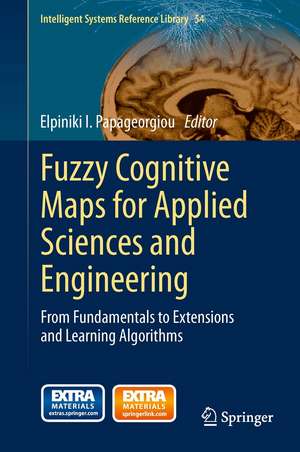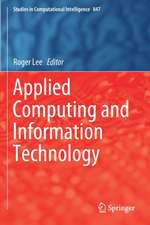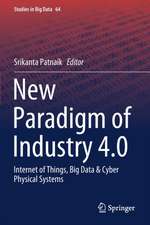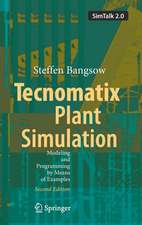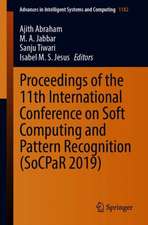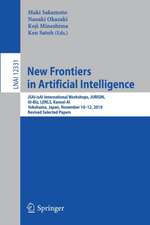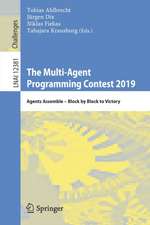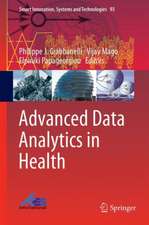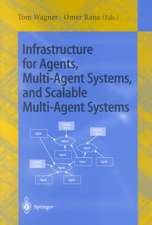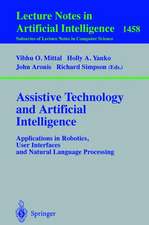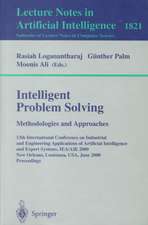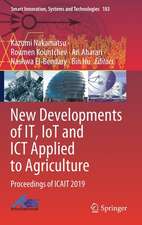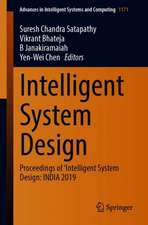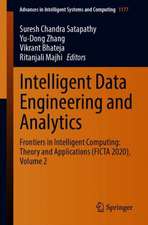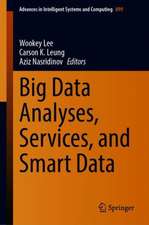Fuzzy Cognitive Maps for Applied Sciences and Engineering: From Fundamentals to Extensions and Learning Algorithms: Intelligent Systems Reference Library, cartea 54
Editat de Elpiniki I. Papageorgiouen Limba Engleză Hardback – 17 dec 2013
During the last 10 years, an exponential growth of published papers in FCMs was followed showing great impact potential. Different FCM structures and learning schemes have been developed, while numerous studies report their use in many contexts with highly successful modeling results.
The aim of this book is to fill the existing gap in the literature concerning fundamentals, models, extensions and learning algorithms for FCMs in knowledge engineering. It comprehensively covers the state-of-the-art FCM modeling and learning methods, with algorithms, codes and software tools, and provides a set of applications that demonstrate their various usages in applied sciences and engineering.
| Toate formatele și edițiile | Preț | Express |
|---|---|---|
| Paperback (1) | 651.75 lei 6-8 săpt. | |
| Springer Berlin, Heidelberg – 30 apr 2017 | 651.75 lei 6-8 săpt. | |
| Hardback (1) | 658.19 lei 6-8 săpt. | |
| Springer Berlin, Heidelberg – 17 dec 2013 | 658.19 lei 6-8 săpt. |
Din seria Intelligent Systems Reference Library
- 20%
 Preț: 1050.57 lei
Preț: 1050.57 lei - 20%
 Preț: 1157.60 lei
Preț: 1157.60 lei - 20%
 Preț: 648.44 lei
Preț: 648.44 lei - 20%
 Preț: 650.08 lei
Preț: 650.08 lei - 20%
 Preț: 1005.64 lei
Preț: 1005.64 lei - 5%
 Preț: 968.88 lei
Preț: 968.88 lei - 20%
 Preț: 1052.67 lei
Preț: 1052.67 lei - 20%
 Preț: 1171.46 lei
Preț: 1171.46 lei - 20%
 Preț: 1164.84 lei
Preț: 1164.84 lei - 20%
 Preț: 815.83 lei
Preț: 815.83 lei - 20%
 Preț: 989.96 lei
Preț: 989.96 lei - 20%
 Preț: 1063.41 lei
Preț: 1063.41 lei - 20%
 Preț: 504.37 lei
Preț: 504.37 lei - 18%
 Preț: 1113.26 lei
Preț: 1113.26 lei - 20%
 Preț: 1920.04 lei
Preț: 1920.04 lei - 20%
 Preț: 990.62 lei
Preț: 990.62 lei - 20%
 Preț: 651.57 lei
Preț: 651.57 lei - 20%
 Preț: 645.97 lei
Preț: 645.97 lei - 20%
 Preț: 660.16 lei
Preț: 660.16 lei - 20%
 Preț: 647.13 lei
Preț: 647.13 lei - 20%
 Preț: 654.05 lei
Preț: 654.05 lei - 20%
 Preț: 649.93 lei
Preț: 649.93 lei - 20%
 Preț: 648.11 lei
Preț: 648.11 lei - 20%
 Preț: 657.99 lei
Preț: 657.99 lei - 20%
 Preț: 656.84 lei
Preț: 656.84 lei - 20%
 Preț: 1624.04 lei
Preț: 1624.04 lei - 20%
 Preț: 642.98 lei
Preț: 642.98 lei - 20%
 Preț: 649.60 lei
Preț: 649.60 lei - 20%
 Preț: 651.23 lei
Preț: 651.23 lei - 20%
 Preț: 653.06 lei
Preț: 653.06 lei - 20%
 Preț: 1002.99 lei
Preț: 1002.99 lei - 20%
 Preț: 645.14 lei
Preț: 645.14 lei - 20%
 Preț: 658.33 lei
Preț: 658.33 lei - 20%
 Preț: 644.98 lei
Preț: 644.98 lei - 20%
 Preț: 646.62 lei
Preț: 646.62 lei
Preț: 658.19 lei
Preț vechi: 822.74 lei
-20% Nou
Puncte Express: 987
Preț estimativ în valută:
125.95€ • 131.83$ • 104.83£
125.95€ • 131.83$ • 104.83£
Carte tipărită la comandă
Livrare economică 31 martie-14 aprilie
Preluare comenzi: 021 569.72.76
Specificații
ISBN-13: 9783642397387
ISBN-10: 3642397387
Pagini: 424
Ilustrații: XXVII, 395 p. 147 illus., 2 illus. in color. With online files/update.
Dimensiuni: 155 x 235 x 30 mm
Greutate: 0.77 kg
Ediția:2014
Editura: Springer Berlin, Heidelberg
Colecția Springer
Seria Intelligent Systems Reference Library
Locul publicării:Berlin, Heidelberg, Germany
ISBN-10: 3642397387
Pagini: 424
Ilustrații: XXVII, 395 p. 147 illus., 2 illus. in color. With online files/update.
Dimensiuni: 155 x 235 x 30 mm
Greutate: 0.77 kg
Ediția:2014
Editura: Springer Berlin, Heidelberg
Colecția Springer
Seria Intelligent Systems Reference Library
Locul publicării:Berlin, Heidelberg, Germany
Public țintă
ResearchCuprins
Methods and Algorithms for Fuzzy Cognitive Map-based Modeling.- Fuzzy Cognitive Maps as representations of mental models and group beliefs.- FCM Relationship Modeling for Engineering Systems.- Using RuleML for Representing and Prolog for Simulating Fuzzy Cognitive Maps.- Fuzzy Web Knowledge Aggregation, Representation, and Reasoning for Online Privacy and Reputation Management.- Decision Making by Rule-Based Fuzzy Cognitive Maps: An Approach to Implement Student-Centered Education.- Extended Evolutionary Learning of Fuzzy Cognitive Maps for the Prediction of Multivariate Time-Series.- Synthesis and Analysis of Multi-Step Algorithms of Fuzzy Cognitive Maps Learning.- Designing and Training Relational Fuzzy Cognitive Maps.- Cooperative Autonomous Agents Based On Dynamical Fuzzy Cognitive Maps.- FCM-GUI: A graphical user interface for Big Bang-Big.- Crunch Learning for FCM and Evaluation.- JFCM - A Java library for Fuzzy Cognitive Maps.- Use and evaluation of FCM as a tool for long term socio ecological research.- Application of Fuzzy Grey Cognitive Maps for process problems in industry Papageorgiou.- Use and Perspectives of Fuzzy Cognitive Maps in Robotics.- Fuzzy Cognitive Maps for Structural Damage Detection.- Fuzzy cognitive strategic maps for business management.- The Complex Nature of Migration at a Conceptual Level.- Overlook to the Internal Migration Experience in Gebze through Fuzzy Cognitive Mapping Method.- Understanding Public Participation and Combining Perceptions of Stakeholders’ for a Better Management in Danube Delta Biosphere Reserve.- Employing Fuzzy Cognitive Map for Periodontal Disease Assessment.
Textul de pe ultima copertă
Fuzzy Cognitive Maps (FCM) constitute cognitive models in the form of fuzzy directed graphs consisting of two basic elements: the nodes, which basically correspond to “concepts” bearing different states of activation depending on the knowledge they represent, and the “edges” denoting the causal effects that each source node exercises on the receiving concept expressed through weights. Weights take values in the interval [-1,1], which denotes the positive, negative or neutral causal relationship between two concepts. An FCM can be typically obtained through linguistic terms, inherent to fuzzy systems, but with a structure similar to the neural networks, which facilitates data processing, and has capabilities for training and adaptation.
During the last 10 years, an exponential growth of published papers in FCMs was followed showing great impact potential. Different FCM structures and learning schemes have been developed, while numerous studies report their use in many contexts with highly successful modeling results.
The aim of this book is to fill the existing gap in the literature concerning fundamentals, models, extensions and learning algorithms for FCMs in knowledge engineering. It comprehensively covers the state-of-the-art FCM modeling and learning methods, with algorithms, codes and software tools, and provides a set of applications that demonstrate their various usages in applied sciences and engineering.
During the last 10 years, an exponential growth of published papers in FCMs was followed showing great impact potential. Different FCM structures and learning schemes have been developed, while numerous studies report their use in many contexts with highly successful modeling results.
The aim of this book is to fill the existing gap in the literature concerning fundamentals, models, extensions and learning algorithms for FCMs in knowledge engineering. It comprehensively covers the state-of-the-art FCM modeling and learning methods, with algorithms, codes and software tools, and provides a set of applications that demonstrate their various usages in applied sciences and engineering.
Caracteristici
Sytematic and comprehensive insight to fundamentals, modeling methodologies, extensions and learning methodologies for Fuzzy Cognitive maps Includes algorithms, codes, software tools and applications of fuzzy cognitive maps in applied sciences and engineering Presents different case studies of learning algorithms successfully applied to real world problems Includes supplementary material: sn.pub/extras
